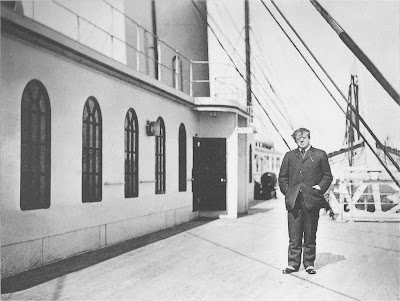Digging up stories about books, writing and publishing.
Monday, July 29, 2013
10 of the Best Free Classic Mysteries for Your Kindle
Amazon makes it difficult to find free books, and that’s understandable: they are, after all, a business. The lack of a browsable list of all free books, though, means that those who want a bargain have to know what they’re looking for in the first place. Maybe it’s just me, but it seems that Amazon is also listing fewer and fewer free books in the “customers also bought …” recommendations.
I’ve come across quite a few classic mysteries in my own searches, and I’ve gathered some of the best here for you. These are all public domain books, so the free price isn’t part of a limited-time special.
Most of these are also available at Project Gutenberg, if you need them in alternate formats. Click the titles below to download the free copies at Amazon.
 |
| Last photo of Jacques Futrelle, taken on the Titanic. |
Jacques Futrelle has been a favorite of mine since reading “The Problem of Cell 13” in one of The Rivals of Sherlock Holmes anthologies. This short is a great introduction to Professor Augustus S. F. X. Van Dusen, known as “The Thinking Machine” for his logical approach to crime. Futrelle’s writing career was unfortunately cut short at age 37 by his fatal trip on the Titanic.
 |
| Early edition of Orczy's The Old Man in the Corner. |
 |
| Tommy and Tuppence, Christie's cool couple. |
Most Christie fans fall into either the Miss Marple or the Hercule Poirot camps, but now and then you run into Tommy and Tuppence people. The Secret Adversary is the first book featuring the young and carefree couple (Thomas Beresford and Prudence Beresford), who seem to evoke the spirit of the ‘20s more than any of Christie’s other creations.
 |
| Rinehart's novel was revised as The Bat. |
 |
| A later pulp edition of The Thirty-Nine Steps. |
You’ve likely heard of The Thirty-Nine Steps even if you’re unfamiliar with the novel. It’s been filmed four times, including the famous Hitchcock version. Published in 1915, it’s credited with popularizing, if not inventing, the “man on the run” type of thriller that is now a Hollywood staple.
The first of the Dr. Fu Manchu series (titled The Mystery of Dr. Fu Manchu in the UK), this book introduces the character that has become synonymous with evil criminal masterminds. He’s referred to as "the greatest genius which the powers of evil have put on the earth for centuries."
 |
| Philip Trent makes a mess of the case, but the end result is plenty entertaining. |
E. C. Bentley supposedly wrote Trent’s Last Case in 1913 as an answer to Arthur Conan Doyle. Bentley was annoyed with Holmes’ perfection, so he created artist-cum-journalist Philip Trent, who is more notable for what he gets wrong. Agatha Christie called it one of the three best mystery novels of all time.
 |
| A Spanish version of Raffles' exploits. |
Don’t think for a minute that the likeable bad guy is a modern invention. A. J. Raffles, “the gentleman thief”, was wooing Late Victorian-Era readers in 1899. Raffles moves in high society, plays cricket, and is also an ingenious burglar. In many ways, he’s the anti-Holmes.
 |
| One of the original illustrations for Mortmain. |
This short was one of my favorite discoveries of last year, and the inspiration for the hand-with-a-mind-of-its-own that turns up in films like The Hands of Orlac and Mad Love. It’s the wacky surgeon rather than the victim that really steals the show, though, and his bizarre experiments make this a story to remember.
 |
| Frontispiece to the original French book. |

No comments:
Post a Comment